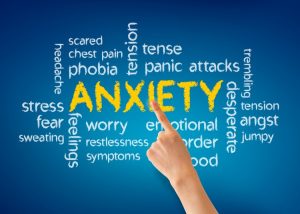
At its roots, anxiety comes from fear. Anxiety can first appear as a mild state of stress, but when unmanaged, it can become crippling. When anxiety starts to take over our lives, it can become unmanageable and turn into full blown, paralyzing panic attacks. Thankfully anxiety counseling services can help.
In dealing with anxiety, I help clients understand the root of their fear, help them identify their triggers and provide tools that can help overcome the anxiety. I have successfully aided many clients in conquering panic attacks, as well as phobias and OCD (Obsessive Compulsive Disorder).
I utilize anxiety counseling tools such as thought logs to identify negative thinking patterns, bilateral stimulation (which I call “every other”), calming body techniques, and Emotionally Focused Technique (EFT), also known as “tapping,” which uses acupressure points to calm anxious physical sensations and re-wire the brain’s response to anxiety or panic. I am also trained in EMDR (Eye Movement Desensitization Reprocessing), which can help to overcome the root triggers for anxiety, phobias and OCD.
Many also struggle with social anxiety, which includes symptoms such as the fear of being embarrassed, avoiding social situations and relationships, being unable to speak in a group of people, feeling unable to talk with new people, and an intense fear of public speaking. Social anxiety can be crippling and can make people feel isolated, left out and judged. My social anxiety counseling techniques help clients to understand origins of social anxiety, their own personality type, and what social intuition and social thinking skills can help them think differently about their social presentation.
The good news is that anxiety can be addressed, treated and overcome. Read my blog post The Anxiety Beast to learn more about anxiety and how anxiety counseling services can help.
Depression has its’ roots in both a biological chemical imbalance of our brain neurotransmitters and a psychological response to the events in our life. Prolonged stress, trauma, negative emotions and difficult life circumstances can erode us mentally, emotionally and physically. In time, these circumstances can then effect the way our body and brain work, resulting in a clinical depression. Though not all who experience a sense of depression will be clinically depressed, many of the tools are the same: talking through it, looking at the negative thoughts/beliefs that have become embedded in your thinking, ways of relating and living that cause one to withdraw. There is hope for depression.
After evaluation and discussion with the client, we may decide together on a referral to either a doctor for medication or for testing to identify if there is a biological effect to the depression/anxiety or to clarify the diagnosis for best treatment. Tools may include EMDR, brain spotting, EFT tapping or internal family systems to reprocess big feelings.
